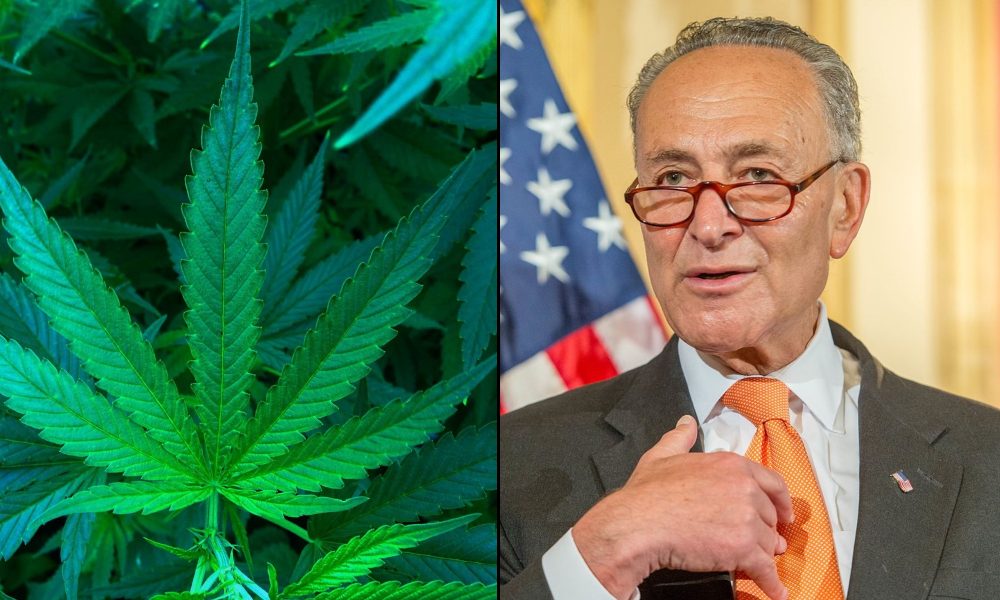Senate Majority Leader Chuck Schumer (D-NY) on Tuesday defended his recently filed bill to federally legalize marijuana, rejecting the idea that reforming cannabis laws leads to increased crime or drug use.
At a press briefing, the leader was asked to respond to prohibitionist arguments about possible consequences of enacting cannabis reform.
He said flatly that “the overwhelming evidence from the states that have legalized cannabis is there has not been an increase in crime and has not been an increase in drug use.”
“I think it makes a great deal of sense” to legalize marijuana, Schumer said.
Watch Schumer defend his cannabis legalization bill in the video below:
The comments come a week after Schumer, Senate Finance Committee Chairman Ron Wyden (D-OR) and Sen. Cory Booker (D-NJ) formally introduced the Cannabis Administration and Opportunity Act (CAOA), a draft version of which was unveiled last year.
The briefing with the leader on Tuesday also overlapped with a Senate Judiciary subcommittee hearing on cannabis reform that was happening at the same time—a first-of-its-kind meeting in the chamber. The panel, chaired by Booker, involved significant discussion of the new legalization legislation.
CAOA quickly gained two new cosponsors last week, including the third-highest-ranking Senate Democratic, Assistant Majority Leader Patty Murray (D-WA).
But there’s a general expectation among advocates and lawmakers that the legislation is unlikely to be enacted this Congress given the steep 60-vote threshold it would need to pass through the Senate. Not all Democrats were on board with the draft proposal, and GOP members would likely oppose it.
—
Marijuana Moment is tracking more than 1,500 cannabis, psychedelics and drug policy bills in state legislatures and Congress this year. Patreon supporters pledging at least $25/month get access to our interactive maps, charts and hearing calendar so they don’t miss any developments.![]()
Learn more about our marijuana bill tracker and become a supporter on Patreon to get access.
—
Even so, Schumer is readily advocating for the broad reform proposal, even as he’s reported to be holding high-level talks with bipartisan and bicameral offices about advancing a separate package of incremental reform measures, including a bill to protect banks that work with marijuana businesses that’s passed the House seven times in some form.
Over the weekend, the leader also joined advocates and community leaders in New York City to launch a new cannabis resource center that’s meant to promote equity in the state’s marijuana market.
Schumer said at the event that New York’s cannabis law, and its equity components in particular, should serve as a model for the rest of the country. But while the state’s reform move is a positive step, he stressed the need for a federal policy change in order to most effectively achieve social justice.
He said on the Senate floor last week that he’s committed to working with bipartisan offices to get “something” done on cannabis reform “this year,” seemingly leaving the door open to using provisions of CAOA as the basis for what would effectively be a marijuana omnibus of modest reforms.
The House sponsor of the bipartisan Secure and Fair Enforcement (SAFE) Banking Act said this week that the introduction of CAOA was a necessary “hurdle” to advance his cannabis reform legislation before he retires at the end of the current Congress.
Another complication in enacting broad legalization is President Joe Biden, who maintains a stiff opposition to the policy change. Instead, he’s campaigned on modest changes such as decriminalization, rescheduling and continuing to allow states to set their own policies.
After more than a year in office, however, he’s yet to take any meaningful steps to make good on those campaign pledges. And days before the House passed the MORE Act in April, then-Press Secretary Jen Psaki reaffirmed that Biden’s position on legalization has not changed.
That said, the White House drug czar recently said that the Biden administration is “monitoring” states that have legalized marijuana to inform federal policy, recognizing the failures of the current prohibitionist approach.
The president also made his first substantive comments on cannabis policy this month, reaffirming to reporters that he doesn’t believe that people should be in prison over marijuana and stating that his administration is “working on” cannabis clemency issues.
Meanwhile, the U.S. House of Representatives approved a recently revised bipartisan marijuana research bill on Tuesday, and the Senate is expected to quickly follow suit before sending it to the president’s desk. Advocates expect that Biden would be inclined to sign the narrow, research-centric legislation.
Senator Files Bill To Allow Marijuana Advertising On TV And Radio In Legal States
Medical Disclaimer:
The information provided in these blog posts is intended for general informational and educational purposes only. It is not a substitute for professional medical advice, diagnosis, or treatment. Always seek the advice of your physician or other qualified healthcare provider with any questions you may have regarding a medical condition. The use of any information provided in these blog posts is solely at your own risk. The authors and the website do not recommend or endorse any specific products, treatments, or procedures mentioned. Reliance on any information in these blog posts is solely at your own discretion.







